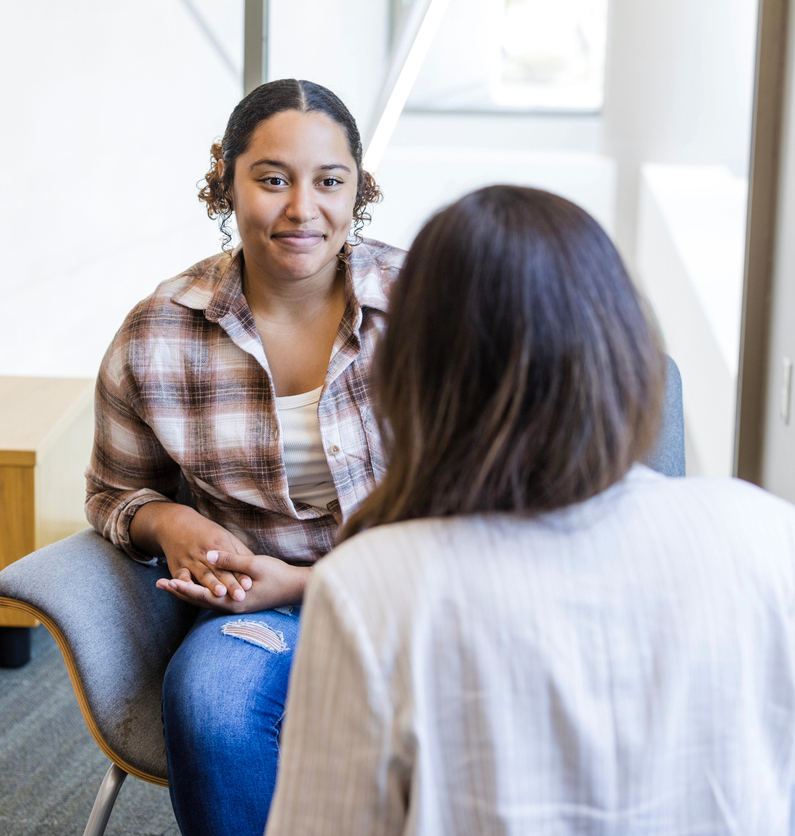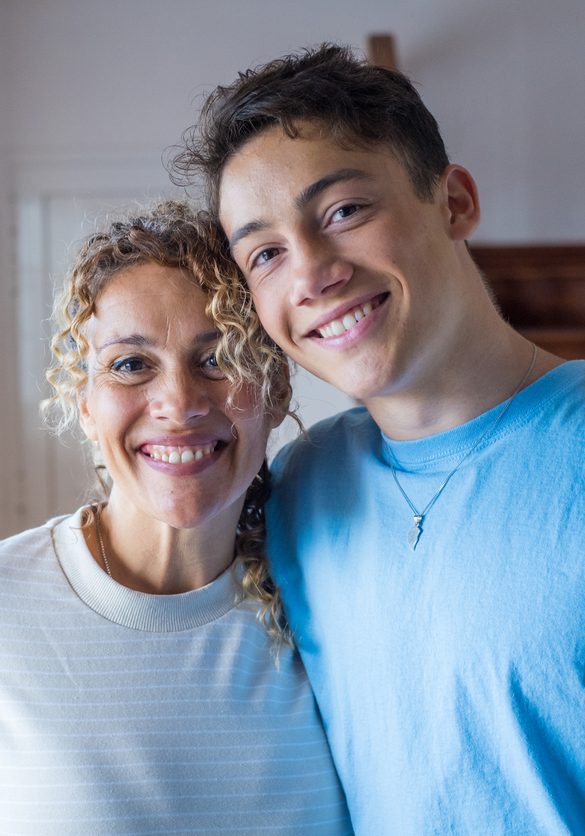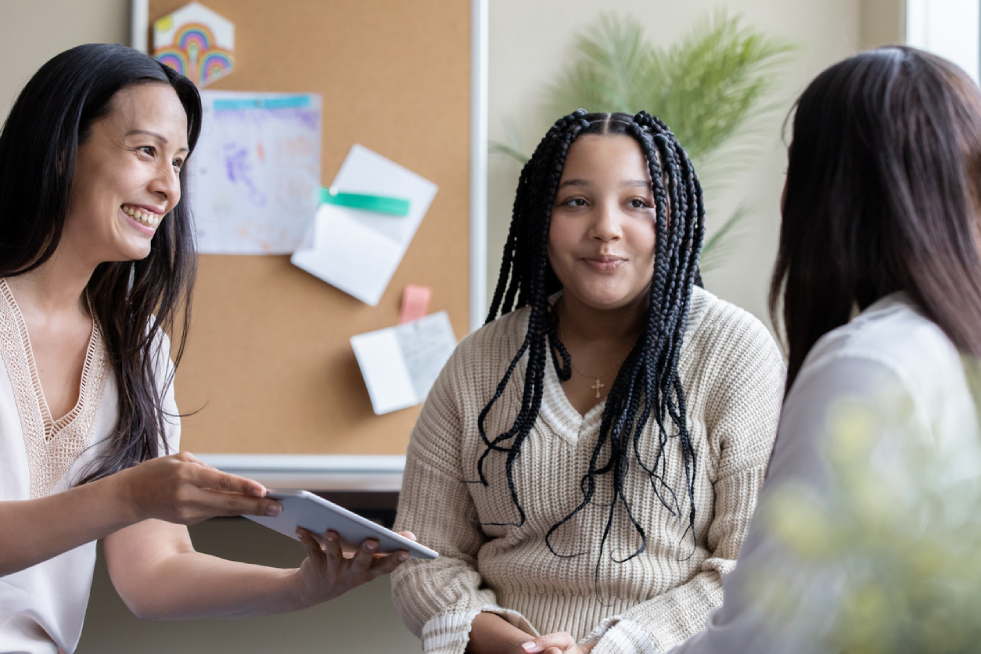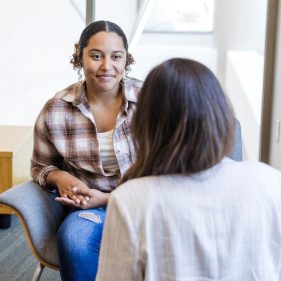When a teenager or adolescent is struggling with substance use, compulsive behavior, or other mental health challenges, helping them as a loved one can feel complicated. Teenagers are going through significant emotional and physical changes. How you connected or communicated with them may seem to not work anymore. It can be frustrating at best and terrifying at worst.
At CMC, our Adolescent and Family Services team is specially trained and equipped to work with teens and adolescents aged 14-18 struggling with substance use and other compulsive behaviors, such as gaming and gambling. We’re also skilled in working with co-occurring disorders and other challenges that often accompany these problems, such as anxiety, depression, trauma, and executive functioning challenges (e.g., Attention Deficit and Hyperactivity Disorders, or ADHD, and Autism Spectrum Disorders (ASD).
We bring understanding, evidence-based treatment (science!), and kindness to each unique teen and their family.
WHAT TO EXPECT FROM OUR ADOLESCENT
AND FAMILY SERVICES

We offer scientific explanations of compulsive behaviors and unhealthy habits in teens and adolescents by conducting thorough evaluations of substance use patterns and other problematic behaviors like gambling or gaming. We also assess for co-occurring mental health issues. We help teens and their caregivers understand the behavior and teach them the skills to make positive changes.
Our clinicians focus on identifying and nurturing teens' and adolescents' unique strengths and talents rather than solely addressing perceived deficits. Our adolescent program utilizes proven therapies such as Cognitive Behavioral Therapy (CBT), Dialectical Behavior Therapy (DBT), Motivational Interviewing, and family-based interventions to address substance misuse and related issues. We help teens and adolescents identify their values and teach them skills to help them achieve their goals, including stress management techniques, healthy coping mechanisms, and improved social skills.
When caregivers take steps to learn new behavioral and communication skills, they model positive change for the teen. This often motivates the teen to seek help and remain in treatment longer, given that they feel supported by their caregiver’s commitment to growth. Our team offers caregivers a variety of ways to learn new skills, including individual therapy, family therapy, workshops, and family groups.
Our clinicians provide families with a variety of skills to enhance collaboration and connection while reducing defensiveness. This helps build stronger, more meaningful relationships between adolescents and teens and their caregivers, creating a supportive environment for positive behavioral changes to take hold.

Executive functioning deficits and other mental health issues like depression and anxiety often co-occur and can exacerbate substance misuse. For example, research shows that approximately 30-40% of anxious adolescents and teens may develop substance use issues, while others turn to other compulsive behaviors like excessive gaming or gambling as coping mechanisms.
At CMC, our team employs proven, evidence-based therapies, including:
Cognitive Behavioral Therapy (CBT)
Exposure and Response Prevention (ERP) for Obsessive Compulsive Disorder (OCD)
Dialectical Behavior Therapy (DBT) adapted for adolescents and teens
We focus on equipping adolescents and teens with practical skills to manage anxiety and other mental health issues to foster resilience and more effective coping. We help them learn decision-making and emotion-regulation skills to improve their ability to make healthy behavioral and relationship choices.

Our approach emphasizes self-awareness, patience, and self-compassion for adolescents and teens and their caregivers. We recognize the impact of trauma on substance misuse and provide specialized care to address these underlying issues.
For example, approximately 60-70% of teens and adolescents experience at least one traumatic event by age 16. This includes various forms of trauma such as accidents, violence, abuse, or witnessing traumatic events. Studies suggest that about 25-30% of traumatized teens and adolescents may turn to substance use as a coping mechanism. Additionally, about 20-30% of teens and adolescents report being bullied, with some studies suggesting the rate could be as high as 35%! While exact percentages vary, research studies suggest that bullied teens and adolescents are 2-3 times more likely to misuse substances compared to their non-bullied peers. Our team is trained to support teens and adolescents who have been bullied or experienced trauma.
We collaborate with the teen or adolescent caregivers and other treatment providers to adequately support them.
By addressing these key elements, we create a comprehensive, compassionate, and effective program for teens and adolescents struggling with substance misuse and other behaviors. Our goal is to foster growth, and positive change for the entire family system.
Teens and adolescents are exposed to stressors such as academic demands, peer pressure, and mental health issues. Many turn to substances or other behaviors like gaming and gambling as a way to cope with feelings or connect with peers. At CMC, we provide teens with personalized expert guidance and support so they can manage life’s challenges better.
We use Cognitive Behavioral Therapy (CBT), Dialectical Behavioral Therapy (DBT), Acceptance and Commitment Therapy (ACT), and motivational approaches to help adolescents see the possibilities of changing behavior while also reducing the harm associated with many high-risk behaviors. Our team works hard to make treatment engaging and applicable to many of the life events that teens face.
When we work with adolescents, we ask that caregivers be involved. This typically means caregivers have their own individual family therapist with us, and the teen work with an adolescent therapist at CMC. This arrangement gives teens space to think through their own reasons for making changes and provides their caregivers space to think through communication strategies, rewards and positive affirmation, natural consequences, and limit-setting while maintaining consistency in their interactions.
As a caregiver or family member, our work with you will be based on the Invitation to Change® approach (ITC), which brings evidence-based principles and practices--including kindness!--together in a way that will help you encourage positive change in your teen. It will also help you bring self-compassion and care to yourself.
The ITC can help you:
- Lessen the tension, conflict, and heated emotion in your relationship with your teen or adolescent and your household and whole family
- Allow yourself to be part of the change process and be taken care of on this journey
- Talk to your teen in ways that foster collaboration and encourage change
- Respond more effectively to the positive changes your teen makes and to their less positive behaviors, allowing natural consequences to play a role in motivating change
There’s no such thing as one-size-fits-all adolescent mental health treatment. Every teen or adolescent is unique and experiences unique challenges that require special attention. That’s why we provide an individualized adolescent mental health treatment program for each client.

Comprehensive assessment with the teen or adolescent and caregiver or other family member
Individual therapy sessions (45-50 minutes)
Parent or caregiver coaching sessions using the Invitation to Change approach (ITC)
Relational family therapy with teen and caregivers or parents
Parent support group
Access to neuropsychological and academic testing
Referral to psychiatric evaluation with trusted psychiatrists who have expertise in working with teens and adolescents with substance use disorders and other mental health challenges
Drug testing
We work with teens in outpatient treatment via in-person and telehealth. We offer group and individual therapy sessions. While undergoing adolescent therapy, teens can attend school and participate in other activities (sports, extracurriculars, etc.). We also collaborate with other caregivers to meet their treatment needs.
Speak with a member of our Intake Team to explore options for your teen today!





